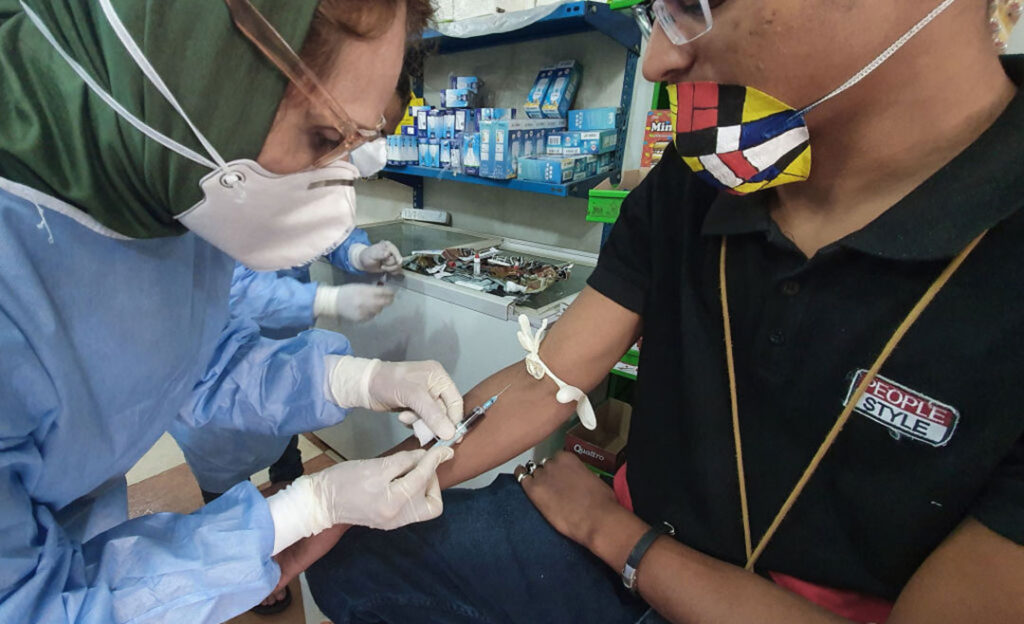ADF STAFF
Since the first outbreak of COVID-19 in February, Africa has reported slower spread, fewer cases and fewer deaths than Europe and the Americas. What makes Africa so different?
The Africa Centres for Disease Control and Prevention (CDC) has set out to find an answer to that question by looking for COVID-19 antibodies in people across the continent.
When COVID-19 first appeared in Africa, models predicted that more than 3 million people would die from the disease. Nearly six months later, however, the continent has reported just 1.2 million cases and fewer than 30,000 deaths across a population of 1.3 billion people. With 613,000 cases, South Africa continues to dominate the continent’s reported COVID-19 presence.
With a median age of 19.7 years, Africa is significantly younger than other parts of the world. That might be one factor that has reduced the impact of a disease that is most fatal for those who are older and in poor health.
“What is important is far fewer people are coming down with the disease,” Africa CDC director John Nkengasong said in announcing the study in August. “How many people are infected and asymptomatic on our continent? We don’t know that.”
When COVID-19 infects a person, that person’s immune system creates antibodies to fight off the virus. It’s those antibodies Africa CDC researchers are seeking. Some people might be carrying the virus and never know it. If so, their antibodies will tell the tale.
The study also can help researchers determine the true scope of the disease when nations still struggle to perform enough testing and return results in a timely fashion.
“We still have a lot of countries that have a few centralized points for testing. So, if a case happened in a remote area, the likelihood of that case to be tested decreases,” Tanzanian epidemiologist Justin Maeda, head of the Africa CDC’s Surveillance and Disease Intelligence Unit, told the BBC podcast More or Less in early August. “Second, because we have few testing points and there is increased demand, it ends up with a serious backlog of samples waiting to be tested.”
Along with that, COVID-related deaths in rural areas may be missed because they are not reported. Also, religious and cultural practices requiring quick burials could prevent the recording of causes of death, according Nana Koft Quaki, a Ghanaian public health researcher.
“Many of the deaths that happen at home, the main way you’d get that data is through a death certificate,” Quaki told More or Less. “In rural areas, that might not be happening.”
Reopening Borders
By looking at likely exposure, Africa CDC researchers could learn whether the continent actually has fewer cases and fewer deaths or simply fewer people showing symptoms. Determining the true scale of virus exposure can help national leaders decide when to reopen borders, Nkengasong said.
The Africa CDC plans to survey the entire continent for antibodies to COVID-19. Surveyors will begin with seven countries — Cameroon, Liberia, Morocco, Nigeria, Sierra Leone, Zambia and Zimbabwe.
A previous antibody study conducted in Kenya looked at 3,000 blood donors between the ages of 15 and 64 and found about 5% of them had antibodies. Expanded to the entire country, that means potentially 1.6 million people have been exposed to the virus. As of August 26, Kenya reported 33,016 cases and 564 deaths since the outbreak began.
The continentwide antibody search is in line with the Africa CDC’s ongoing response to COVID-19, which began with a goal of creating huge economies of scale in detecting, preventing and treating the disease. Working with the World Health Organization, the Africa CDC’s Africa Task Force for Coronavirus expanded the number of laboratories capable of testing for COVID-19 from two to 43.
Asymptomatic people have become a focus of public health efforts to stop the spread of COVID-19 because they can spread the virus without realizing it. Mask orders aim to disrupt the spread of COVID-19 by capturing the virus-carrying droplets asymptomatic people emit from their mouths and noses.
How widespread could asymptomatic people be? In Mozambique, according to the Africa CDC, researchers recently found that residents in 5% of households in Nampula — roughly 42,000 of the city’s estimated 848,000 residents — had COVID-19 antibodies, indicating they had been exposed to the virus. The virus turned up in all the city’s neighborhoods.
As of August 26, Mozambique reported 3,508 cases and 21 deaths nationwide in a population of 29.5 million.
“We don’t know why more are not being hospitalized,” Ilesh Jani, director of Mozambique’s National Institute of Health, said during the CDC announcement. “In Nampula we thought we would see more mortality.”

